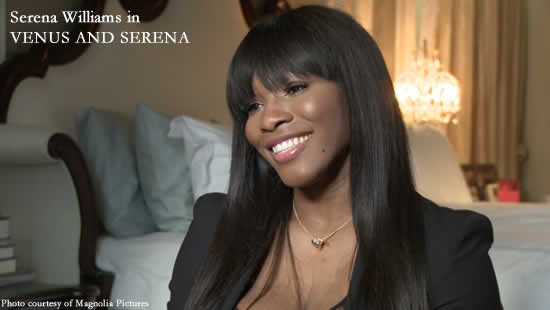 Venus and Serena takes an unfiltered look into the remarkable lives of the greatest sister-act professional tennis has ever seen. In a sport where they were not welcomed, the indomitable Williams sisters faced the opposition with grace and courage not only breaking new ground for female and African American athletes everywhere, but dominating the women’s game for over a decade. The film tells the inspiring story of how these two women, against all odds, but the help of visionary parents, made it to the top.
Venus and Serena takes an unfiltered look into the remarkable lives of the greatest sister-act professional tennis has ever seen. In a sport where they were not welcomed, the indomitable Williams sisters faced the opposition with grace and courage not only breaking new ground for female and African American athletes everywhere, but dominating the women’s game for over a decade. The film tells the inspiring story of how these two women, against all odds, but the help of visionary parents, made it to the top.
Venus and Serena also explores the struggle of these two aging superstars during the 2011 tennis season as they battle life and career-threatening health problems. In Venus and Serena we gain unprecedented access into the sisters’ lives – both in the spotlight – and behind closed doors, and we watch as they draw their greatest strengths from one another to overcome countless adversities.
Venus and Serena is directed by Maiken Baird and Michelle Major
Bijan Tehrani: What motivated you to make Venus and Serena?
Michelle Major: Venus and Serena’s story is a great American story. It had to be told. People didn’t know what went into these women becoming major icons and being able to dominate in tennis for over a decade.
BT: How challenging was the subject?
MM: It was incredibly challenging for lots of reasons. We had to spend a lot of time in pre-production. Venus and Serena have a rigorous schedule so it’s difficult to follow them around. Both, getting access to old footage of them and dealing with lots of people involved in the story were big challanges. Their father comes on the practice court every single day. So we had to ask his permission to be in the film. We also had to ask the mom for her permission. It was challenging but quite enjoyable actually.
BT: How cooperative were Venus and Serena when you were dealing with them directly and talking to them?
MM: They were very cooperative. They are very private people and it took us three years to get access to the story and to get them to agree to do the documentary but once they agreed, they were totally on board and there was nothing we couldn’t ask. Sometimes, they might not be thrilled by the questions, for example “How did you feel when your parents got divorced?”, but they answered every question openly and as honestly as they could.
BT: When you watch the film, it’s so entertaining. It’s very satisfying by giving footage of their childhood, from people who helped them get to where they are, of the challenges they faced… How long did it take to do the pre-production and the research part?
MM: We did the preparation for the film during the three years that we were also trying to get access to them, so while we were trying to get access to them, we were also researching their stories, but both of us already knew a great deal about their stories – the way they had first come on the scene when they were young.
 BT: You have a great visual style and the film almost reads like an action movie. How did you come up with the visual style?
BT: You have a great visual style and the film almost reads like an action movie. How did you come up with the visual style?
MM: In terms of the visuals, it’s usually a collaborative process between me and my co-director, Maiken Baird and our editor, Sam Pollard, a great editor – one of the best actually, he has won an Academy Award for his work as an editor. So it was a collaborative process finding the story and the structure and how to make it work visually.
BT: What was the reaction of Serena and Venus to the film?
MM: I don’t think Serena wanted to see the film right away. I don’t know exactly why, I think she had an urgency right away. She actually only saw it recently and loved the film, and she actually sent a recorded message for the premiere show. Venus loved the film too. I think it’s always hard to see yourself in a long form documentary about your life. I think that’s why they haven’t come and seen it with an audience yet. But they are also always busy.
BT: One thing about the film is it’s not about sports only. It has a very positive message about how you can get where you want if you try really hard.
MM: It does have a very positive message. That was a goal to make an inspiring film. It’s an inspiring story. Even when things go terribly wrong – and things go terribly wrong for everyone at some point in their lives – you can overcome it and do great things. When she drives through her old neighborhood and she’s nearly caught in a cross fire, it nearly ruins Serena’s career, but she came back from the emotional pain of that to become number one in the world again. And then coming from meager means, they were taught to be survivors and to do more than survive but thrive and be a light in the world.
BT: Thank you very much!

